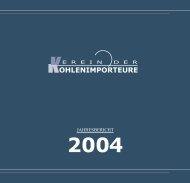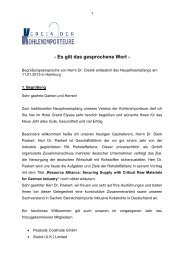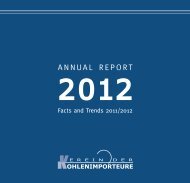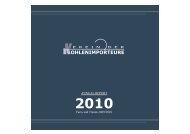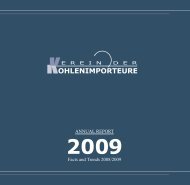Annual Report 2010 - Verein der Kohlenimporteure eV
Annual Report 2010 - Verein der Kohlenimporteure eV
Annual Report 2010 - Verein der Kohlenimporteure eV
Create successful ePaper yourself
Turn your PDF publications into a flip-book with our unique Google optimized e-Paper software.
Over the course of <strong>2010</strong>, coking coal import prices rose<br />
steadily up to €185/t in November <strong>2010</strong>. This reflected<br />
rising demand for coking coal worldwide, which<br />
became very noticeable during the second half of the<br />
year. High prices can also be expected in 2011.<br />
Overall, it can be stated that world market prices for<br />
coking coal are significantly closer to the average<br />
production costs in Germany than is the case for steam<br />
coal.<br />
Renewables on the Rise – start-up support<br />
for new technologies grows to a massive,<br />
permanent public subsidy<br />
The share of renewable energies in total final energy<br />
consumption rose further to 10.5% in <strong>2010</strong> owing to the<br />
generous subsidy and priority feed-in un<strong>der</strong> the EEG<br />
(German Act on Renewable Energy Sources).<br />
Renewable energies accounted for (provisional):<br />
<br />
primary energy demand, and<br />
<br />
Primary Energy Consumption / Renewable<br />
Energies by Sectors<br />
2008<br />
Mtce<br />
2009<br />
Mtce<br />
<strong>2010</strong><br />
Mtce<br />
Electricity 21.3 21.8 24.5<br />
Heating 13.3 14.5 16.2<br />
Fuels 4.5 4.0 4.3<br />
Total<br />
HT-D23 Source: AGEB<br />
39.1 40.3 45.0<br />
Renewable Energies: Germany’s Unilateral Action<br />
Results in a Heavy Burden for its Citizens – With no<br />
<br />
Despite the installed capacity for wind power increased<br />
by 5.5% or 1,551 MW, and in photovoltaics increased<br />
<br />
wind dropped by about 5.5%. So, power generation<br />
from renewable energy sources from wind stagnated.<br />
Nevertheless, because of the priority feed-in, the<br />
absolute share produced from renewables increased,<br />
especially due to the rapid hike of solar power plants.<br />
With a functional EU Emissions Trading Scheme<br />
to protect the climate, the EEG (Renewable Energy<br />
Sources Act) no longer makes sense. In fact, its effects<br />
run counter to emissions trading. The support for “green<br />
electricity” in Germany reduces energy production from<br />
fossil sources of energy and releases CO 2 certificates for<br />
trading. So, the price for the CO 2 certificates falls. Other<br />
EU countries can then produce more cheaper electricity<br />
from fossil fuels. German consumers end up subsidising<br />
fossil energy production in the EU and around the world.<br />
The effect on the climate is virtually nil.<br />
Emissions trading in Europe achieves almost nothing<br />
in terms of global climate improvement. Although it<br />
reduces the demand for fossil fuels in Europe and makes<br />
their use more expensive, it does nothing to reduce the<br />
worldwide use of fossil fuels. Unless an international<br />
CO 2 trading system is established and a global climate<br />
protection treaty is concluded, German and European<br />
efforts are doomed to failure and are an unnecessary<br />
expense for taxpayers.<br />
55



